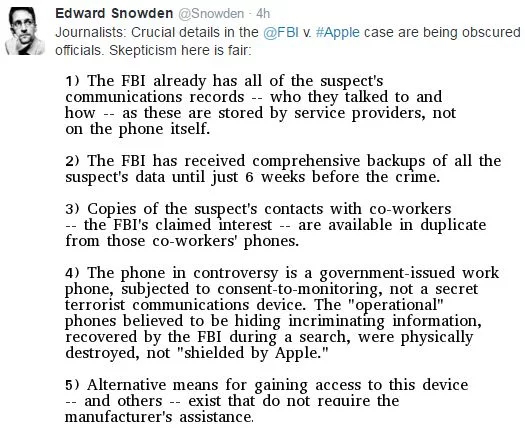The infotech war has begun, for real.
First we had the fight over illegal file sharing, creating a divide between Big Entertainment backed up by Big Government and a large portion of the general public. (Young people in particular.) Parallel we have had the fights between Big Telecom and activists campaigning for a free and open internet. And the struggle between Big Intelligence and civil rights / privacy advocates.
Then came Edward Snowden, providing actual proof of what our governments are up to. This created an even bigger splash, still causing ripples.
And with the San Bernardino iPhone backdoor/unlock case between the FBI and Apple the tech sector will have to choose between loyalty to its’ customers or abiding by overreaching anti-terrorism and anti-privacy legislation. That ought to be easy enough. The money is with staying loyal to customers and their right to privacy. But it’s not. Not even Silicon Valley might be able to stand up against the state monopoly on violence.
The stakes are sky high. The San Bernardino case is not just about that single case or even just about privacy. It’s about secure encryption – imperative for safe communications, online banking, medical records, confidential information, trade secrets and public affairs. Apple cannot back down on this one.
This might be what finally will unite all sorts of activists and the Valley. I rather hope so. Alone, it’s very difficult to stand up against the government (and related special interests). But if the Internet generation, net activists, civil rights defenders and tech companies stand together — we might stand a chance.
Unjust laws will stay unjust if no one stands up and fight them. Civil rights will be eroded if no one stands up to defend them. There are no limits to what governments will try to justify under the pretext of security — that, by the way, is an illusion.
The government will always try to “balance fundamental rights and security”, time and time again until there are no fundamental rights left.
Now is the time for activists (who know how to actually change politics) to team up with Silicon Valley (where the money needed to make campaigning effective is).
We can win this one — and at the same time establish a red line that governments will have to recognize.
But it will be dirty. It’s all about power and control.
/ HAX
Related: Apple’s FBI battle is just the beginning of a reality check for the tech sector »
